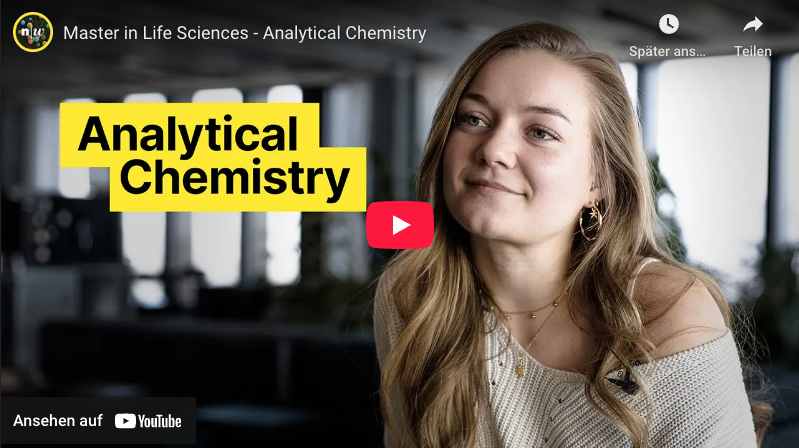MSc in Life Sciences - Analytical Chemistry
Hochschule für Life Sciences FHNW
Do you want to understand biological systems at the molecular level and work with the latest analytical methods? Then the Master’s degree in Analytical Chemistry at our university is your next step.

- Specialised training in Analytical Chemistry: Gain in-depth knowledge of modern analytical methods such as high-resolution mass spectrometry and 2D NMR spectroscopy to investigate and characterise complex biological systems.
- Practice-oriented master thesis: Complete an eight-month master thesis, often carried out in collaboration with industry partners, to gain practical experience in real projects.
- Individual study design: Choose from a wide range of modules and tailor your studies to your interests and career plans.
- International opportunities: Spend an exchange semester abroad or do your thesis at one of our partner universities.
- Career opportunities in research and industry: Prepare yourself for challenging tasks in the pharmaceutical industry, bioanalytics and related fields.
Steckbrief
Zukunftsaussichten
What career opportunities are open to you?
Analytical chemistry underpins almost all life science disciplines and plays a central role in studying drugs, formulations, metabolites, foodstuffs, natural products, materials and medical products. Demand for specialists is growing steadily as technological developments and the need for deeper molecular insights drive research. This degree prepares you for challenging roles in both industry and academia.
The demand for experts in the field of analytical chemistry is steadily increasing as technological developments and the demand for deeper insights at the molecular level drive research activities in life sciences.
Typical areas of employment for graduates are:
- Pharmaceutical and biopharmaceutical companies: medicine development and quality control.
- Research and development laboratories: analysis and characterisation of biological systems.
- Regulatory authorities and certification bodies: Monitoring and evaluation of analytical methods.
-
- Food and environmental analysis: Examination of constituents and pollutants.
-
Aufbau und Inhalte
The programme provides in‑depth knowledge of modern analytical methods and their applications. The focus is on strategies for investigating, identifying and characterising metabolites, biomarkers, proteins, formulations and biological tissues.
Core modules are dedicated to masss pectrometry (MS) sand NMR spectroscopy including high-resolution MS/MS andadvanced 2D NMR techniques. Other topics include structural protein analysis, characterisation of solids and biological systems imaging.
You can also choose modules from related fields such as Organic Chemistry, Bioanalytics, Biotechnology or Pharma Technology. This allows you to structure your studies in a flexible and practical way – tailored to your interests and professional goals.
Module Groups for the Analytical Chemistry specialisation
A total of 50 ECTS credits (i.e. 17 modules each worth 3 ECTS credits) must be earned. Other modules can be selected: Module overview (English)
You can also plan your studies in advance with our MSc Life Sciences planning tool.
Details on the degree programme
Vertiefungen
International
Students can apply to do an additional semester at Linköping University (Sweden) and thus obtain a double degree. Independently of the double degree, you may also complete your Master’s thesis abroad to gain international experience. Further information is available from the International Office or here: Double Degree.
Leitung und Dozierende
Voraussetzungen, Zulassung, Eignungsabklärung
Direct admission requires
If you do not fully meet the requirements, you may be invited to a personal interview.
Proof of sufficient English skills must be provided with one of the following certificates:
If you are unable to provide evidence of the required command of English, you are obliged to improve it during your master’s degree programme. You can either attend the advanced English course offered by the FHNW School of Life Sciences or other suitable language courses. At the end of the programme, proof must be provided that the required level of English has been achieved (see table above).
